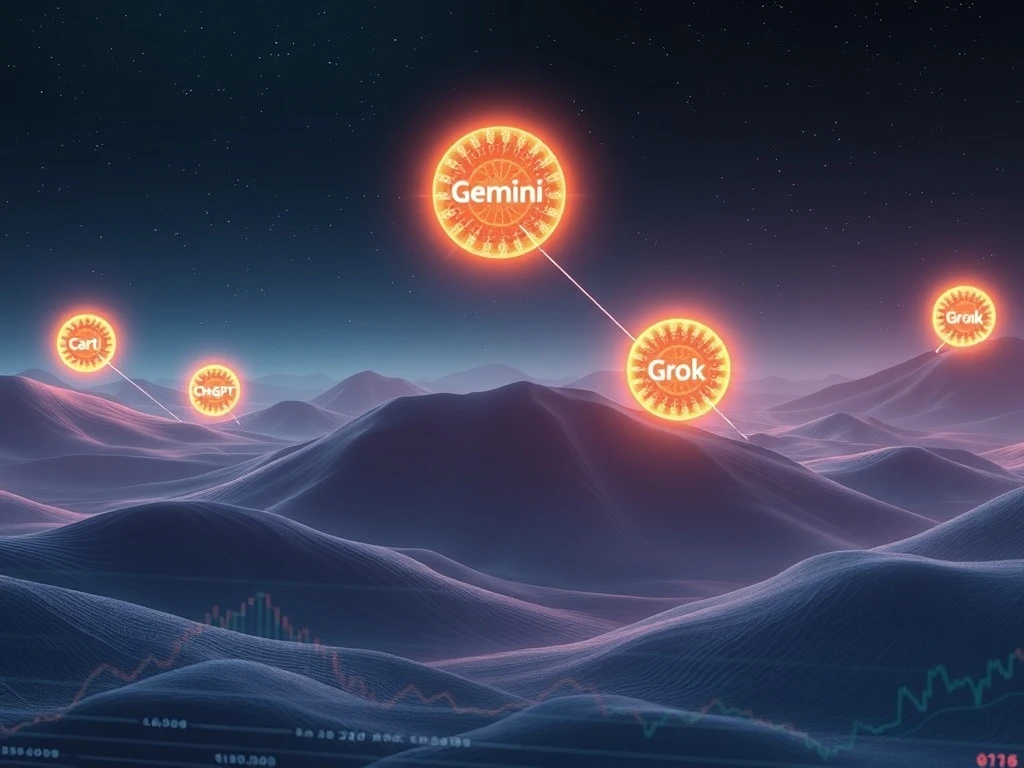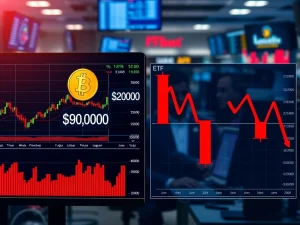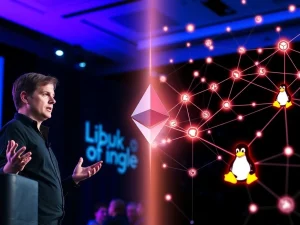Gemini AI Model Unleashed: Kalshi Bettors Predict Dominance by 2025

In the rapidly evolving world of artificial intelligence, a fascinating trend is emerging from the prediction markets. Bettors on Kalshi, a prominent prediction market, are placing significant wagers on Google’s Gemini AI model. They anticipate it will become the leading AI text model by the close of 2025. This intriguing forecast reflects the dynamic shifts occurring within the competitive landscape of large language models (LLMs). For cryptocurrency enthusiasts, this highlights how decentralized prediction platforms offer unique insights into future technological advancements.
Kalshi’s Bold Forecast: Gemini AI Model Leads the Pack
The Kalshi prediction market has become a focal point for anticipating the future of AI. Recently, the odds for Google’s Gemini have dramatically improved. Since Tuesday, the Gemini AI model has secured a commanding lead. A significant 57% of users now bet on Gemini, marking a notable increase from its previous 48.1% position. This upward trend contrasts sharply with its primary competitors.
During the same period, OpenAI’s ChatGPT model experienced a decline. Its betting share fell to 20% from 25.4%. Similarly, xAI’s Grok saw its odds decrease to 15% from 18.8%. These shifts illustrate a clear sentiment among market participants regarding the trajectory of these leading AI systems. This particular Kalshi prediction scenario will resolve on December 31, 2025. Bettors backing the winning model will receive their allocated amounts. The LM Arena Leaderboard, an open platform for interacting with leading AI models, will verify the outcome. Currently, this prediction scenario has seen an impressive $7.4 million in trading volume.
The Shifting Tides: Why Gemini AI Model Gained Ground
Several key developments explain the rising confidence in the Gemini AI model. Google announced a series of significant updates for Gemini on August 15. These enhancements included a new storybook mode, an improved reasoning model, and temporary chats that do not save in a user’s history. These features likely contributed to the positive sentiment among bettors. Meanwhile, competitors faced their own challenges.
OpenAI, for example, experienced missteps with its ChatGPT-5 rollout. Many users criticized the new version. OpenAI CEO Sam Altman even had to defend the model on X (formerly Twitter). Furthermore, xAI’s Grok encountered well-publicized problems. Users accused the model of exhibiting political bias, leaning either right or left. The company also faced scrutiny for allegedly praising Adolf Hitler in some posts, forcing them to delete specific content. These contrasting experiences certainly influenced the AI text model predictions on Kalshi.
The Intense LLM Race: A Battle for Supremacy
The pursuit to become the world’s top large language model has intensified significantly in recent months. The industry vies for position across various domains. One crucial area is internet search, where many AI models gather their information and sources. Last Tuesday, AI company Perplexity made a substantial $34.5 billion unsolicited cash offer to acquire Google’s Chrome browser. Chrome currently holds the majority share in the internet browser market. Reports also indicate OpenAI’s interest in purchasing the browser. This highlights the high stakes in the ongoing LLM race.
Beyond these giants, new players are gaining traction. DeepSeek, an AI company based in China, has steadily increased its market share. In April, it released Prover 2, a new model advanced in mathematics. The competition is not just about features; it extends to foundational resources. For instance, Bitcoin miners and AI firms are increasingly competing for access to cheap, sustainable energy sources. This fierce competition underscores the rapid pace of innovation and expansion within the AI sector.
Navigating the Future: AI Competition and Regulatory Hurdles
Despite the rapid advancements, the future of AI competition 2025 faces potential barriers through antitrust actions. In October 2024, G7 nations’ antitrust authorities indicated a willingness to take action. They aim to protect competition in the AI field. This signals a growing concern among global regulators regarding market concentration and potential monopolies. Both Google and Meta, significant players in the AI industry, are currently facing antitrust lawsuits. Google is defending itself against a US District Court lawsuit. Meta faces legal action from the Federal Trade Commission. These ongoing legal battles could significantly affect the pace and direction of AI development. Ultimately, the outcome of these regulatory challenges will shape the future landscape of the AI industry. The Kalshi prediction market offers a unique lens into how market sentiment perceives these complex dynamics.






